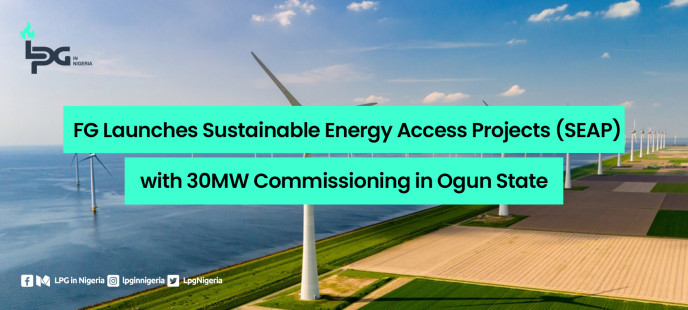- 3518
- 0
Sharing Ideas and Updates on LPG in Nigeria and related information to enable effective collaboration within the LPG Value Chain
FG Launches Sustainable Energy Access Projects (SEAP) With 30MW Commissioning In Ogun State

In a bold stride toward addressing Nigeria’s persistent energy challenges, the Federal Government has officially launched the Sustainable Energy Access Projects (SEAP) — a landmark initiative that aims to bridge the electricity gap across all 774 Local Government Areas (LGAs) in the country. The launch was marked by the commissioning of a 30-megawatt decentralized power facility in Shagamu LGA, Ogun State, a move hailed as a major milestone in Nigeria’s clean energy transition journey.
The announcement was made by the Minister of Innovation, Science and Technology, Chief Uche Geoffrey Nnaji, via his official X (formerly Twitter) account. In his statement, he described SEAP as a transformative solution to Nigeria’s energy challenge, designed to drive development from the grassroots through inclusive and impactful interventions.
What is SEAP and Why Does It Matter?
The SEAP initiative is set to deliver a minimum of 5 megawatts of clean, decentralized energy to each LGA, with a specific focus on rural and peri-urban communities. The aim is not only to increase electricity access but also to support key sectors such as agro-processing, healthcare, transportation, and small and medium-scale enterprises (SMEs) — all of which are crucial for inclusive economic growth.
This decentralized approach will allow for flexibility in implementation, enabling clean energy solutions to be tailored to local needs while reducing pressure on the national grid.
Three Key Components of SEAP
SEAP is structured around three core interventions that target the most pressing energy-related issues in underserved Nigerian communities:
Solar and Gas-Powered Mini-Grids
Mini-grid systems will be deployed to provide reliable off-grid electricity in remote and rural areas, where grid extension is either not feasible or too costly.
Electrification of Tricycles
The project includes the conversion of 1,000 petrol-powered tricycles per LGA into electric tricycles, significantly cutting down on fossil fuel usage and air pollution in densely populated urban areas.
Clean Cooking Initiative
Perhaps one of the most impactful arms of SEAP is the clean cooking program, which aims to replace the use of firewood and charcoal with LPG and CNG cylinders for over 20,000 households per LGA. This initiative targets indoor air pollution, deforestation, and health hazards — particularly those affecting women and children.
Strategic Partnerships and MoU Signing
At the launch event, a tripartite Memorandum of Understanding (MoU) was signed between the Association of Local Governments of Nigeria (ALGON), Data Analytics & Solutions International Ltd, and CCK Electric Power Technology Company. This strategic partnership underscores the government’s commitment to cross-sector collaboration as a means to scale energy access rapidly and sustainably.
Minister Nnaji also emphasized that SEAP aligns with President Bola Ahmed Tinubu’s Renewed Hope Agenda, which places clean and inclusive energy access at the center of national development priorities.
A Call for Global Support and Local Impact
The Ministry has extended a call to development partners, particularly the United Nations Development Programme (UNDP), to support SEAP’s implementation. Their involvement will be key in ensuring that the benefits of the program reach marginalized groups, including women, youths, and remote communities.
The nationwide rollout of SEAP is expected to:
l Create thousands of jobs
l Improve productivity in rural Nigeria
l Cut down greenhouse gas emissions
Support progress on Sustainable Development Goals (SDGs) in energy, environment, health, and gender equity
LPG in Nigeria is of the opinion that the commissioning of the 30MW facility in Shagamu is not just an infrastructural milestone — it marks the beginning of a decentralized, clean energy revolution in Nigeria. With SEAP, the government is setting a bold vision for universal energy access, where no community is left behind in the journey toward sustainability, economic empowerment, and improved public health.
As this project expands, it promises to light up not just homes and streets, but also hopes for a cleaner, more inclusive future for all Nigerians.
















0 Comment.